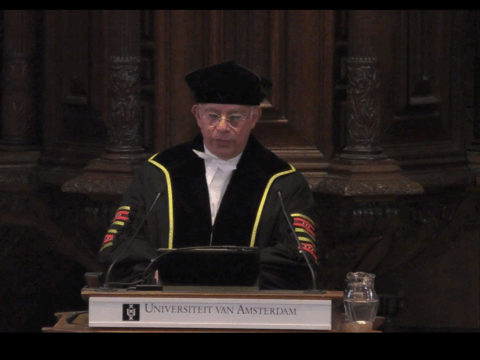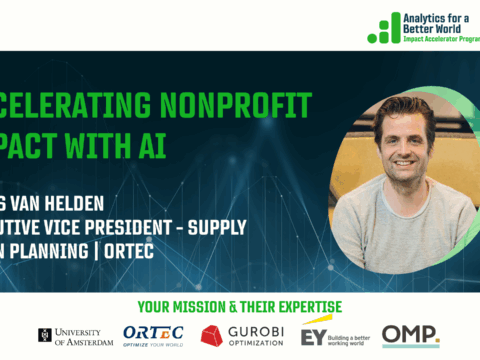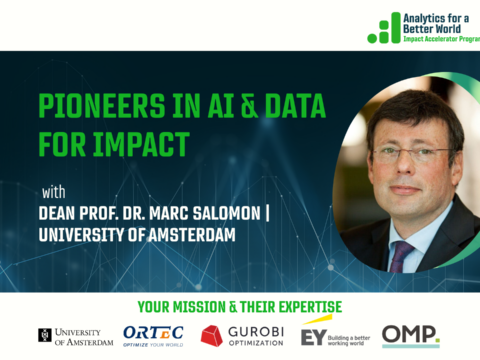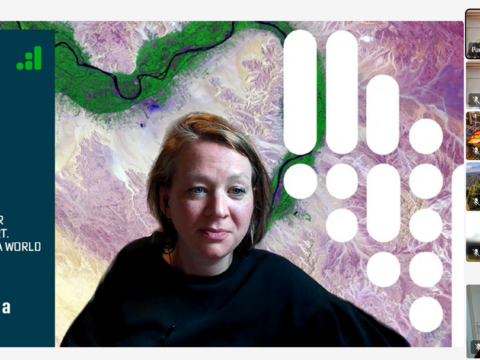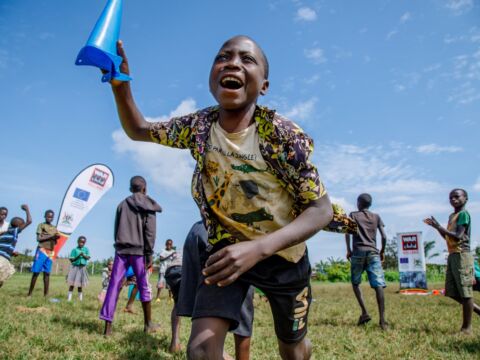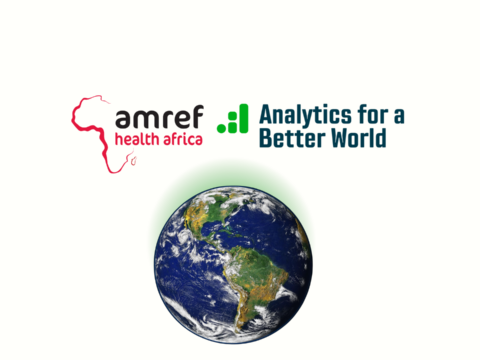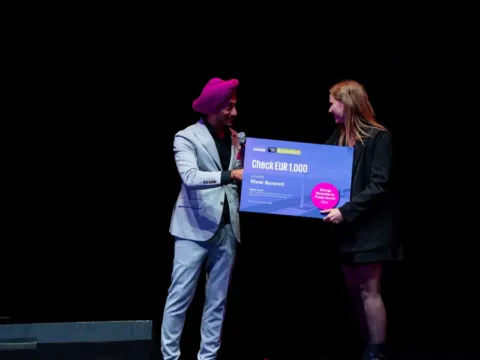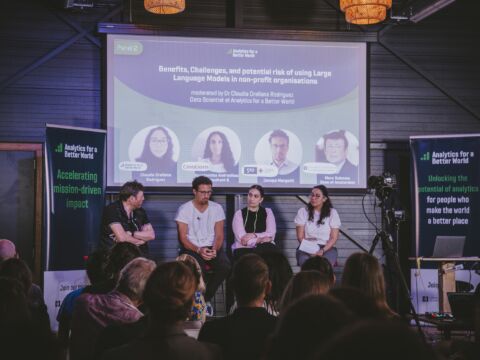Marc Salomon
See profileAnalytics for a Better World
See profilePioneers in AI & Data for Impact
an Interview with Prof. Dr Marc Salomon from the University of Amsterdam
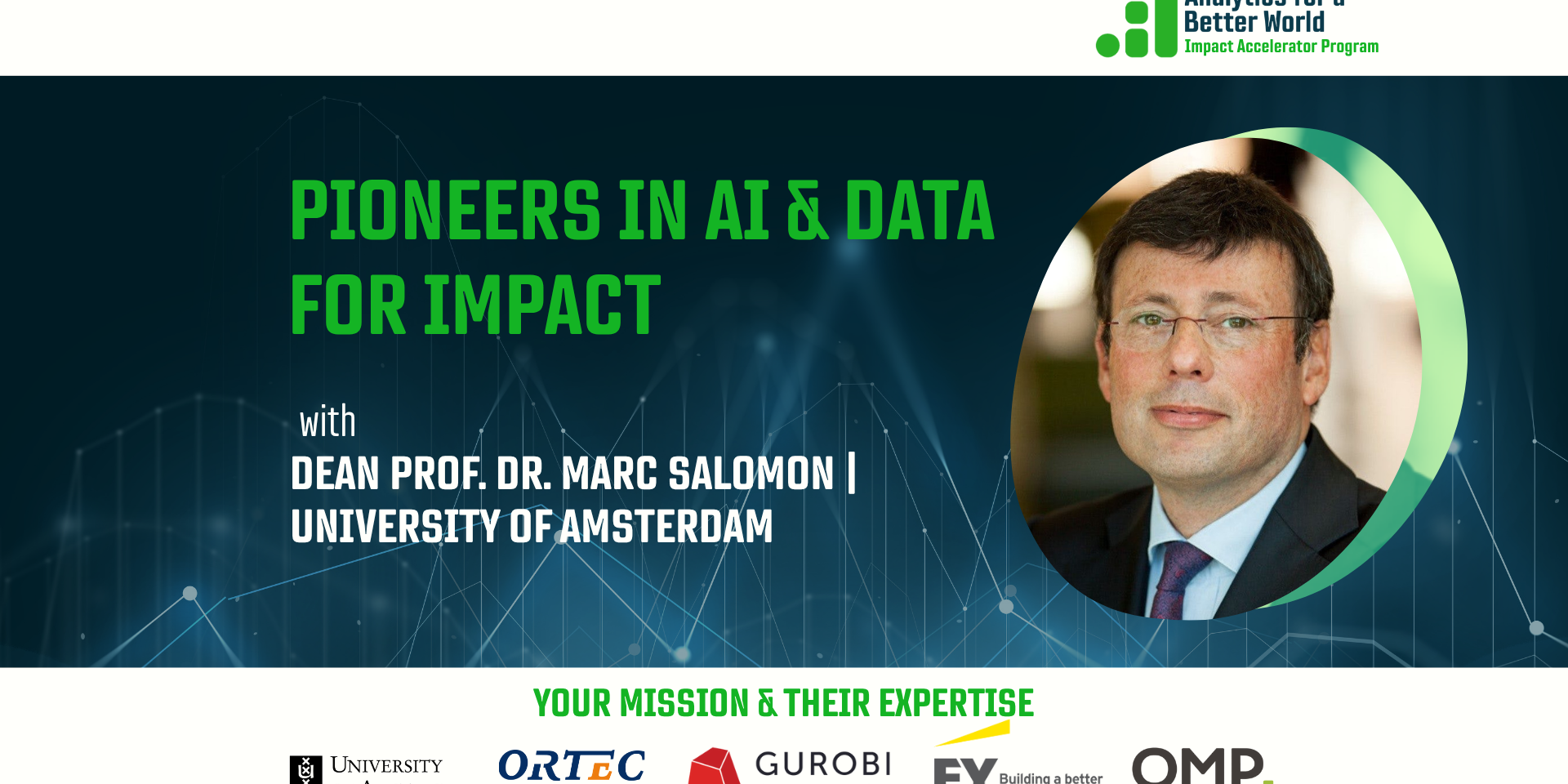
an Interview with Prof. Dr Marc Salomon from the University of Amsterdam – Marc Salomon | Analytics for a Better World | What happens when the world’s best data and AI experts apply their skills and share their tools with nonprofits to solve pressing global challenges? They accelerate progress. This is the promise of Analytics […]
What happens when the world’s best data and AI experts apply their skills and share their tools with nonprofits to solve pressing global challenges? They accelerate progress. This is the promise of Analytics for a Better World (ABW), the nonprofit institute founded three years ago by the University of Amsterdam Business School and ORTEC. Its mission: to bridge the gap between advanced AI applications and the nonprofit sector.
Now, with the launch of the Impact Accelerator Program, ABW is taking its most significant step yet. Five organizations will be selected to work side by side with world-class AI and data analytics experts, tackling critical challenges while building the in-house capability to keep innovating long after the program ends.
To mark this launch, we are speaking with the people who make this all possible. In this interview, Prof. Dr Marc Salomon, Professor at the University of Amsterdam (UvA) and Dean of the Amsterdam Business School.
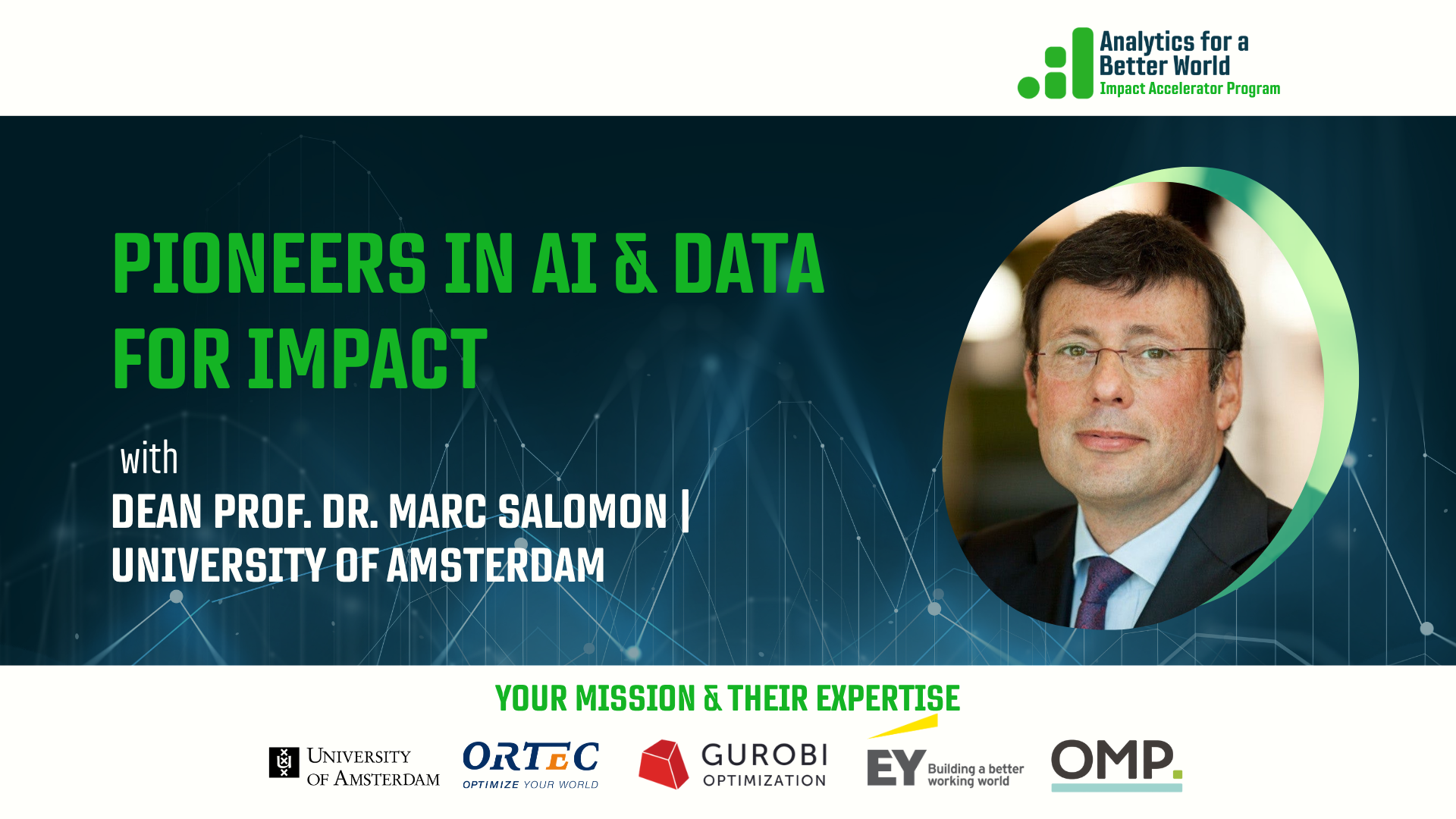
A core expression of our mission
For the University of Amsterdam, ABW isn’t just another partnership. It’s a core expression of their mission.
Supporting society is a ministerial mandate and duty for universities,” Salomon explains. “Analytics and data-driven decision-making are among our core values. The Accelerator Program embodies all these elements, so it fits 100% with who we are.
As one of ABW’s founding institutions, alongside ORTEC, the UvA brings unique strengths: cutting-edge research, talented students eager for meaningful work, and decades of experience in translating complex analytics into practical solutions.
Small-scale progress is still progress
Why are the SDGs so far off track? The answer is both political and pragmatic.
Unfortunately, there are doubts in politics and among citizens about the usefulness of these goals,” Salomon observes. “That’s why it’s very difficult to make progress on a large scale.
Rather than despair, UvA focuses on what’s achievable:
Fortunately, it can work by for example working alongside NGOs. Each nonprofit that becomes more effective through analytics represents a step toward the larger goals.
The Impact Accelerator Program embodies this philosophy: creating concrete impact organization by organization, building toward systemic change from the ground up.
NGOs can do more with less if they embrace analytics
With funding pressures mounting worldwide, the timing of the program couldn’t be better for nonprofits.
NGOs are under pressure due to budget cuts,” Salomon notes. “My hypothesis is that if NGOs deploy analytics, they can do just as much or even more than before the cuts.
The evidence is already visible in everyday applications.
Not everyone can afford a private tutor. But ChatGPT and specialized tools can take on the role of a tutor at minimal cost. Look at Khanmigo, for example.
Academic research shows similar transformation:
Writing a literature review used to take a PhD student six months, and by the time they put the final period, it was outdated. With specialized AI tools from publishers, such an overview is generated in 10 minutes and stays up-to-date, giving PhD students much more time for other aspects of research.
Tailor-made
When discussing the program’s methodology, Salomon emphasizes the importance of flexibility:
I think it’s difficult to follow a ‘fixed trajectory,'” he explains. “Analytics requires a tailored approach for each unique situation. Everything must be custom-made, though we naturally use methods and techniques we’ve successfully applied in the past as much as possible.
This bespoke approach reflects academic rigor: understanding that each nonprofit faces unique challenges requiring unique solutions. It’s not about imposing academic theories but about adapting proven techniques to real-world problems.
“The benefits far outweigh the concerns”
When discussing potential challenges of AI and the use of advanced analytics, Salomon is pragmatic about organizational change.
While I can understand resistance to new technologies, my experience is that the benefits of analytics far outweigh the disadvantages.
He emphasizes that analytics enhances rather than replaces human work:
Analytics brings solutions and improves efficiency. It helps organizations serve more people better, making human efforts more impactful. When people understand this, resistance often melts away.
The ethical dimension is particularly crucial for nonprofits working with commonly underserved populations.
Algorithmic decision-making forces organizations to reconsider their ethical compass. For nonprofits, this means being transparent and mindful about how AI makes decisions and ensuring fairness in how resources are allocated.
Creating tomorrow’s change-makers
Beyond the immediate impact on nonprofits, the program serves another vital purpose:
We hope for exciting cases that when solved have real societal impact and that we can use in education to inspire our students to help as well, Salomon explains.
This creates a virtuous cycle. Nonprofits get cutting-edge analytics support, students gain experience on meaningful projects, and society benefits from both the immediate results and the long-term development of socially conscious data scientists.
Real partnerships
What type of nonprofit would be ideal for the Impact Accelerator Program?
I have no preference for a particular NGO, but I do for a ‘working method,'” Salomon explains. “It is important though that we forge real partnerships, where work is done on both sides.
The program thrives on collaboration and shared learning.
We need good data to work with, and it is important that the outcomes of the work done as part of the Impact Accelerator Program continue once the program finishes. But equally important is the learning that happens within the cohort. The five selected organizations will find a solution to their challenge and will strengthen their capacity, while they also benefit from joint learning and cross-sectoral collaboration.
Salomon emphasizes the mutual investment:
The NGO brings domain expertise and deep understanding of their context. We bring analytical capabilities and fresh perspectives. Together, we co-create solutions that neither could achieve alone.
The academic approach prioritizes sustainable collaboration over short-term interventions. It’s about building lasting partnerships where knowledge exchange benefits everyone involved.
This article is part of ABW’s impact accelerator series, spotlighting the partners and vision behind AI-powered social impact.
Ready to scale your impact?
Over 14 weeks, you'll work directly with experts from UvA, ORTEC, and other partners to tackle urgent challenges in low/middle-income countries. Together, you'll harness the power of data and AI to accelerate progress towards the SDGs.
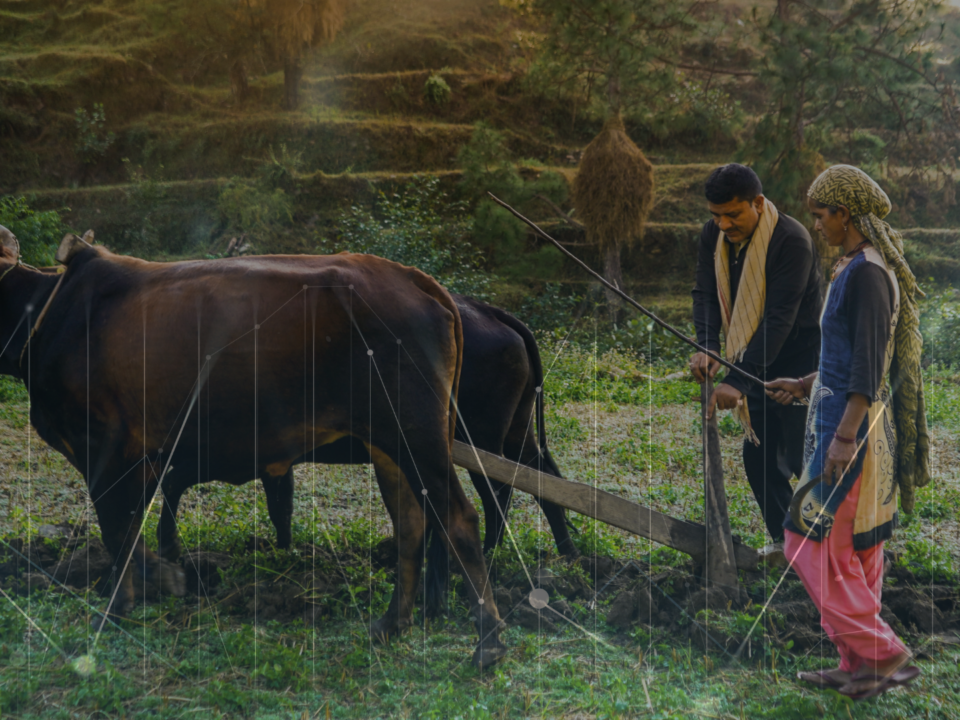
Applications close on October 24th and are reviewed on a rolling basis.
